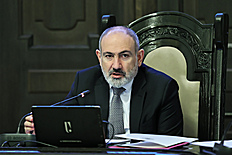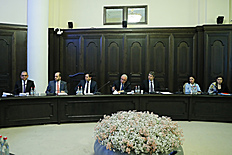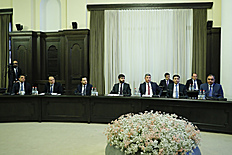Statements and messages of the Prime Minister of RA
Baku’s statements about the legislative field of Armenia are a violation of our country's sovereignty. Nikol Pashinyan
Chaired by Prime Minister Nikol Pashinyan, a regular Cabinet meeting took place.
Before discussing the agenda of the session, the Prime Minister made a speech in which he referred to the aggressive actions of Azerbaijan on the state border of Armenia on February 13 in the area of Nerkin Hand settlement of Kapan enlarged community of Syunik region, as a result of which 4 border guards were killed on combat duty.
In his speech, Prime Minister Pashinyan noted.
"Dear participants of the Cabinet meeting,
Dear people,
On February 13, as a result of the aggressive actions of Azerbaijan, 4 border guards on combat duty at the Armenian state border in the area of the Nerkin Hand settlement of the enlarged Kapan community of the Syunik region were killed.
Expressing my condolences to the relatives and friends of the victims, I consider it necessary to emphasize that what happened is another manifestation of Azerbaijan's unconstructive policy. On February 12, the Azerbaijani media spread information that a soldier of the Armed Forces of Azerbaijan was shot and wounded by an Armenian border guards in the above-mentioned section of the Armenia-Azerbaijan border. After this statement, the Military Police of Armenia issued a statement that they have started an investigation into the incident, as there is a clear order from the Minister of Defense not to allow violations of the ceasefire regime, not to give in to provocations. And therefore, if it is found that there is a violation of the order, there will also be legal consequences. Despite this, the next morning, Azerbaijan opened massive fire in the direction of the above-mentioned positions, as a result of which we suffered four casualties.
The description of the events shows that Azerbaijan's intentions remain the same: to pursue a policy of military coercion against the Republic of Armenia. Our impression is that Azerbaijan does not show any interest in ensuring border stability and security, and there are many reasons for this. For example, as early as 2022, it was agreed that border security issues should also be included in the mandate of demarcation commissions. In line with the agreement, the Republic of Armenia established a commission on the demarcation of the state border and border security between the Republic of Armenia and the Republic of Azerbaijan, assuming that according to the agreement, the commissions will also work on issues related to border security. And Azerbaijan, contrary to the agreement, called its newly established commission the state commission for the demarcation of the state border between the Republic of Azerbaijan and the Republic of Armenia, omitting the security component.
These and several other circumstances give grounds for concluding that Azerbaijan continues to pursue the policy of "give me what I want through negotiation, otherwise I will take it with war."
And what does Azerbaijan want? You have certainly noticed that Azerbaijan regularly talks, as it puts it, about the territories of 4 villages, at the same time refusing to accept that the vital territories of 31 non-enclave villages of the Republic of Armenia are under Azerbaijani occupation. That is, this 4/31 applies to non-enclave villages.
Our position on this situation is very constructive. We say that in order for the troops to move back from their current positions, it is necessary to reproduce the Armenia-Azerbaijan border on the map and on the ground, and to withdraw the troops of the two countries to the border line. That is, after the reproduction of the border, if it turns out that there are troops ahead of that line, both sides should withdraw. In other words, if there are troops from both sides ahead of the border line, they will have to retreat to the already demarcated border.
Official Baku is trying to formulate this situation in such a way that the Azerbaijani troops do not retreat from the territories of 31 villages of Armenia in any way. This is not a constructive position. And again, on behalf of Armenia, I reaffirm the readiness of the Republic of Armenia to go to concrete solutions, the principles of which have already been agreed.
What principles are we talking about? The agreement publicly recorded in writing on international platforms that Armenia and Azerbaijan recognize each other's territorial integrity on the basis of the 1991 Alma-Ata Declaration, and the Alma-Ata Declaration should be the political basis of the border delimitation process. This means that we are left with, essentially, technical work to do: reproduce on maps and on the ground the de jure existing border between the Armenian SSR and Azerbaijani SSR as of 1991, by highlighting their legal bases and resolving the issue. The issue of the so-called exclave/enclaves should also be addressed on the same principle. For example, to determine the territory of Artsvashen, it is necessary to draw its border based on legal documents, and as a result of further negotiations, solve this issue with some formula.
But Azerbaijan regularly avoids such solutions, trying to follow the path of localization. We even agree to this option and carry out the demarcation even region by region, reproducing the border in each sector, and then carry out the adjustment of the positioning of the troops according to the reproduced border, and move on to the next sector, leaving the issues of exclaves to the very last stage.
In other words, there are two options: first, we carry out demarcation along the entire border and proceed to its implementation. The second option is that we divide the border into pieces and proceed with the demarcation piece by piece. And, in fact, both options are acceptable to us, within the framework of the above principles. But Azerbaijan seems to avoid this option as well, and our analysis shows that there may be one reason for this, and that reason may be, for example, the start of military operations in some parts of the border, with the prospect of turning the military escalation into a full-scale war against the Republic of Armenia. This intention can be noticed in all statements and actions from official Baku.
Dear participants of the Cabinet meeting,
Dear people,
It is the policy of the Government of the Republic of Armenia to do everything possible to prevent such developments by engaging in active negotiations, while at the same time standing firmly in the positions of protection of all legitimate interests of the Republic of Armenia. Those legitimate interests are the protection of Armenia's territorial integrity and sovereignty, and I cannot help but notice that a number of statements from official Baku in recent days about the legislative framework of Armenia are a violation of our country's sovereignty and interference in our country's internal affairs. Attempts to interpret that there is any provision preventing the signing of the peace treaty in the legislation of the Republic of Armenia have nothing to do with reality. As I said, during the negotiations of the peace treaty, Armenia and Azerbaijan managed to agree on a number of articles, and one of them is that the parties cannot refer to their legislation with the aim to refuse to fulfill any provision of the peace treaty. Therefore, there is no provision in the legislation of the Republic of Armenia that prevents the implementation of the peace treaty, and this is not only a political but also an expert assessment, the legal nuances of which I do not see the need to delve into at least at this moment.
Dear participants of the Cabinet meeting,
Dear people,
Azerbaijan continues threatening rhetoric also in connection with the reforms of our army and the acquisition of weapons and equipment by the Republic of Armenia. But as I said on January 28 of this year, on the occasion of Army Day, having a strong and combat-ready army is the legitimate right of every country. No one can deny this. The Republic of Armenia recognizes the territorial integrity of all neighboring countries and has no goals outside its own territory. This, by the way, is our long-term strategy, because we believe that legitimacy is the most important component to ensure Armenia's security. The Republic of Armenia has only legitimate goals in the field of defense, namely the defense of its internationally recognized territories. No country can ever accuse any other country of having such a goal.
In conclusion, I want to emphasize again our commitment to the peace agenda and reaffirm our readiness to go to solutions within the framework of the agreed principles, that is, our readiness to sign a peace treaty, carry out demarcation and demarcation. In addition to the above, I must also emphasize our willingness to open regional communications based on the principle of sovereignty, jurisdiction, equality and reciprocity of countries, which is expressed in the "Crossroads of Peace" project. I am sure that the implementation of this project will give a new impetus to the economic development of all countries in our region. Thank you, dear colleagues."


